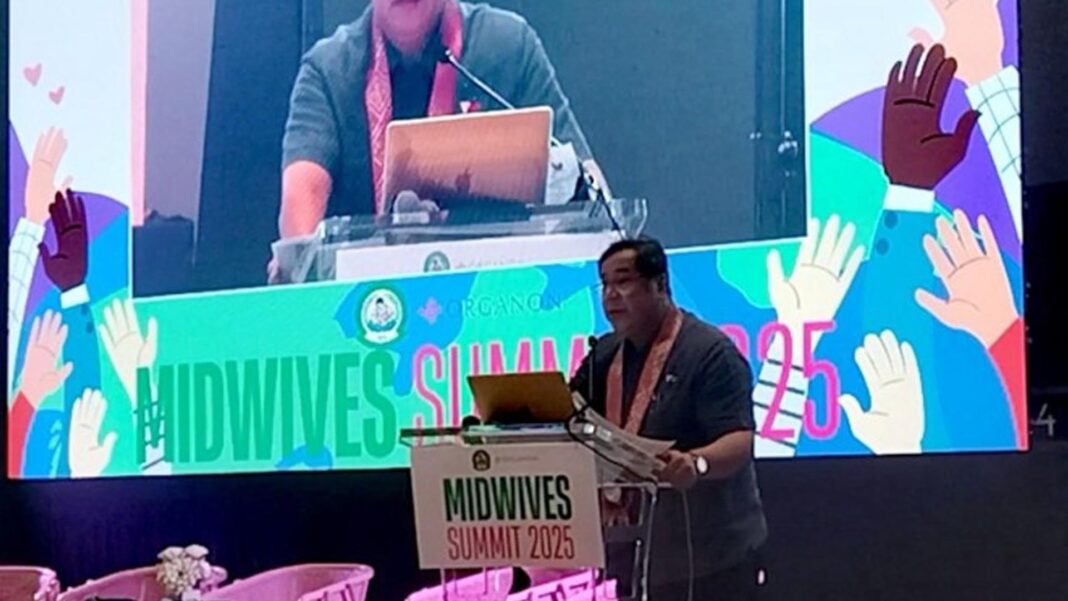The Integrated Midwives Association of the Philippines (IMAP), in partnership with Organon (Philippines), Inc., on Tuesday launched the Midwives Summit 2025, a landmark event aimed at strengthening the role of midwives in advancing universal health coverage (UHC) and expanding access to reproductive health services nationwide.
The summit convened midwives, government leaders, development partners, and advocates to highlight the vital contributions of midwives to women’s health, family planning, and community development.
“This summit is for every midwife who continues to serve women, families, and communities with compassion, competence, and dedication,” said IMAP Executive Director Patricia Gomez. “It is a platform to gain new knowledge, strengthen practical skills, and renew our shared passion for advancing women’s health.”
Family planning, which is recognized as the cornerstone of reproductive health and community well-being, is a key focus of the event.
Experts emphasized that midwives, as the most accessible healthcare providers in many rural and underserved areas, play a central role in expanding women’s choices and ensuring timely, quality care.
IMAP and its partners stressed the importance of empowering midwives as primary care providers within the UHC framework.
This includes scaling up training programs, strengthening mentorship, and ensuring continuous professional development to maintain service quality.
“In the background of a total fertility rate of 1.9 and the increasing adverse dialogue against family planning, midwives must evolve into strong advocates for women’s right to decide when and how many children to have,” Philippine Society for Responsible Parenthood president Bernabe Marinduque said.
“To reduce workforce shortages in FP service provision, the midwives must come up with the initiative and leadership to scale up training and skills enhancement among their members.”
The summit also featured updates on national family planning policies and insights from development partners on sustaining midwifery programs.
Discussions underscored that universal access to RH services aligns with both national priorities and global UHC goals.
Regulatory changes
On the sidelines of the summit, Health Secretary Teodoro Herbosa told reporters that the number of midwives is declining due to regulatory changes in scholarship management.
“In 2024, midwifery scholarships were transferred from DOH to CHED, which has different requirements,” he said, referring to the Commission on Higher Education.
“Ang plano ko kakausapin ko ang CHED. We need to sit together, kase yung pagplano at pag-release niyan dapat kasama ang DOH (I plan to talk to CHED. We need to sit together, the DOH must be included in the planning and release of scholarships).”
Herbosa also noted that low salaries remain an issue because many midwives are graduates of a two-year diploma program, unlike other healthcare professionals with four-year degrees.
Nonetheless, a four-year Bachelor of Science in Midwifery is also offered nationwide to upgrade the role and functions of a midwife, offering more job options and a higher level of training.
Herbosa added that certain health policies require first and fifth pregnancies to be delivered in health facilities due to higher health risks, reducing the opportunities for midwives’ services.
He said if midwives are capable and trained to do a normal delivery and identify risks in patients, then they are good to handle first or fifth pregnancy deliveries.
Challenges
Meanwhile, Commission on Population and Development Executive Director Lisa Bersales highlighted the continuing challenges in women’s and children’s health, noting persistent unplanned fertility among low-income women, stunting among one-third of Filipino children under five, and unchanged mortality rates for infants and young children.
“Women and girls in the country continue to die from preventable causes related to pregnancy and childbirth,” she said, emphasizing the urgency of strengthening maternal and reproductive health services.
For Organon Philippines, the summit reflects its global commitment to advancing women’s health through partnerships with healthcare professionals and government agencies.
Organon is a global healthcare company headquartered in Jersey City, New Jersey, focused on women’s health and biosimilars. It has a portfolio of more than 60 medicines and products across therapeutic areas improving women’s health outcomes.
Through this summit, IMAP and Organon reaffirmed their shared mission to uplift women’s lives by empowering midwives – the frontliners of reproductive health – to lead, advocate, and innovate in the service of Filipino families. (PNA)


